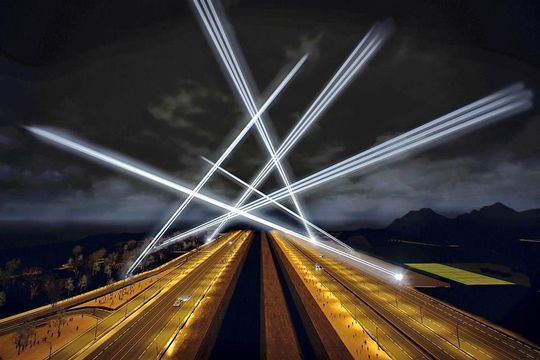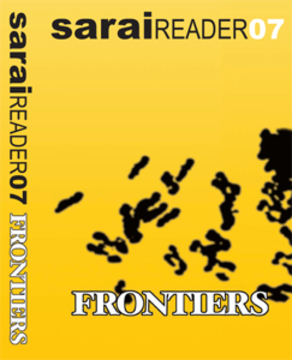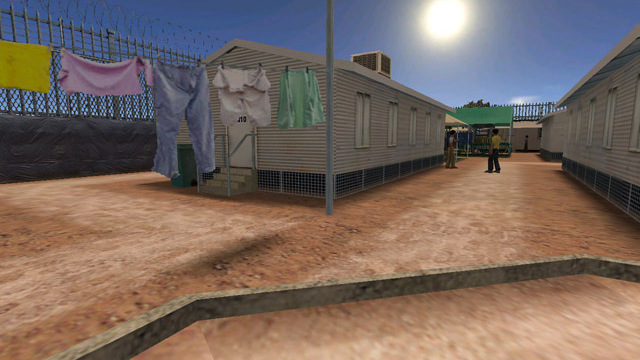Search results for 'borders'
Talking about a Revolution: An Interview with Camille Otrakji
"If you've been following events in Syria, you'd know that the
English-language press is mostly deeply critical of the Assad regime
(while the Arabic press displays a slightly wider range of views). I
thought it would be worth trying to present a minority report on the
situation from a Syrian friend of mine, although, as you will see, he
argues precisely that his position is actually held by a very
significant majority (albeit a rather quiet and frustrated majority) of
Syrians.
Camille Otrakji is a Syrian political blogger based in
Montreal. Although he tends to keep a low profile, Otrakji has been, for
the past several years, at the forefront of many of the most
interesting and influential online initiatives relating to Syrian
politics. He is one of the authors and moderators at Joshua Landis's
Syria Comment, and the founder of Creative Syria, a constellation of
websites including Mideast Image (a vast collection of original old
photographs of Middle Eastern subjects) and Syrian Think Tank (an online
debate site hosting many of Syria's top analysts). Last year, Otrakji
courted controversy with a new initiative devoted to the subject of
Syrian-Israeli peace, entitled OneMideast.org. He agreed to speak with
me about the latest events in Syria, and I'm sure that his views will
generate plenty of discussion."
The Accenture Files
Investigation by the Expose Accenture, the Movement Research Unit, and the Progressive International
Today, the Progressive International, Expose Accenture and the Movement Research Unit release the Accenture Files, revealing the central role of the world’s largest consultancy in the global right-ward turn towards surveillance, exclusion, and strong-men: The Reactionary International.
Based on extensive fieldwork, interviews, and a comprehensive review of internal documents, our investigation demonstrates how Accenture has quietly embedded itself deep into the apparatus of security states worldwide, deploying its vast network of resources, wealth and technology to surveil entire populations, fuel the military-industrial complex and channel immense public wealth to private hands.
Migrants / Media / Metropolis
Migration and media-activists gather with theorists and labour organizers to discuss and share best practices in the fight against precarity and insecure labour conditions. Sharing inspiring examples of social justice unionism and creative campaigning like Justice for Janitors in the U.S. and Cleaners For a Better Future in the Netherlands.
ReadTactical Media After 9-11
It is tempting to portray '9-11' as a turning point. Gore Vidal warns
that, since September 11, the US is in danger of turning into a "seedy
imperial state." Make war, not politics. The new patriotism requires: "Disruption, including obstructing the view or hearing of others, will
not be tolerated." The list of measures to restrict civil liberties,
freedom of speech and privacy, or what?s left of it, doesn?t stop. A
recent conference in Perth concluded that post-September 11 reporting
adds to divisions and stereotypes. "The media's failure to provide more
perspectives to news consumers and ask critical questions is fuelling a
culture of fear and blame around the world, experts say."
Introduction to the N5M Zapbook
The Next Five Minutes is a conference, exhibition and tv program that wants to leave behind the rigid dichotomy between the mainstream, commercial and national tv on one hand and marginal independent tv on the other. Although these differences may still be important, N5M wants to focus on tv-makers crossing the borders of tv-making and going into the spaces that the tv-world still has to offer.
The Art of Campaigning
The idea for the Art of Campaigning topic originates from the works of
the McLibel group [www.mcspotlight.org]. Their type of net.campaign
questions previous forms of activism, which was focused on the mass
media and their ability to influence public opinion, by staging direct
action (targeted at known media makers). Big NGO's such as Greenpeace
have built up experiences with this model for decades. The scenarios
they use have not changed much since the seventies. There is the usual
PR material: official reports, books, folders, flyers, magazine and
original video footage, shot on location. Campaigns are being planned
long in advance. The way of working does not differ much from a
campaign to launch a new product. Professionalism has taken over the
task of volunteers. Their role is being reduced to that of a local
support group, doing the actual grass roots work with the population.
Islam and Tactical Media in Amsterdam
Essay written in August 2002 for the New York University Tactical Media Lab, organised by the NYU Center for Media, Culture and History.
Chance 2000 - The Last Chance Party (1998)
Right in time for the 1998 German elections, Christoph Schlingensief decided to found his own party with the futuristic-sounding name CHANCE2000 - motto: Vote Yourself!
World Charter of Free Media
Tunis March 2015
We, communicators and activists committed to multiple emancipatory communication practices across different regions of the world, freely assembled in March 2015 in Tunis, on the occasion of the 4th World Forum on Free Media, organized in the framework of the World Social Forum 2015, adopt this World Charter of Free Media, as the result of our collective reflection initiated in 2013, and as an expression of our resistance, and our commitment to just and emancipatory communication, and our engagement with world developments and humanity.
Wikileaks Statement on the 9 Month Anniversary of Cablegate: Release of 133,887 Cables
Over the past week, WikiLeaks has released 133,887 US diplomatic cables from around the world - more than half of the entire Cablegate material (251,287 cables). The new release was met with a sustained Denial of Service (DOS) attack during the first 36 hours. WikiLeaks had to rely on back-up servers for some hours. With supporters? help, WikiLeaks was able to bring in additional servers to stave off the attack.
ReadNext 5 Minutes 3
Amsterdam & Rotterdam, The Netherlands, 12-14 March, 1999
The third Next 5 Minutes, an Amsterdam based conference on tactical communications culture, featuring do-it-yourself media, dissident art and electronic media activists from around the world, took place on the 12th, 13th and 14th of March 1999.
N5M3 archived festival website
ReadA Rift in Empire?
The antiwar demonstrations of February 15, 2003 proved it: theself-organization of free singularities is possible on a planetaryscale. And that was an event, despite all that followed. In amanifesto-text written just after those demonstrations, I used thelanguage of Negri and Hardt to say that the multitudes could create arift in Empire. In a context where the Aristocracy (the greattransnational companies) had been weakened by a string of financialdisasters, where the Monarchy (the political and military command ofthe earth) had fallen apart in serious dissension, I wanted toencourage the democratic action of the Plebe, against the scorn of theAmerican, British, Spanish and Italian leaders. It was a moment thathad multiplied the world's political stages, overflowing thetraditional mechanisms of representation.
The Next 5 Minutes
tactical media event
Amsterdam & Rotterdam, The Netherlands, 12-14 March, 1999
www.n5m.org
(Source: Updated announcement Feb 11, 1999)
Signs of the Times
Friday, October 05, 2001 12:20 PM
subject: Activism After September 11
Dear Friends,
This essay was published today in The Nation. It's
an attempt to discuss what the atrocities of September 11 might mean to
those of us who are publicly critical of corporate power and the
current global economic model. There are no easy answers to this
question so the essay is more of a meditation on symbolism and tone
than a political roadmap.
Take care,
Naomi
Indonesia: The Web as a Weapon
CAPABLE OF cutting through time and space, the Internet offers a means of communication not previously dreamed of. It has created important new possibilities as it shrinks distances and provides an astounding volume and variety of information to those who have computer access. One result of these is the acceleration of the development of solidarity networks among peoples, regions, and countries. In Indonesia, it has even managed to help topple a strongman who, until his unscheduled resignation in May 1998, had been Asia's longest reigning postwar ruler. To Indonesia's powers that be, controlling the Internet has become close to being an obsession.
ReadA New Geography of Power?
The formal political system today faces a new geography of power.
Globalization and the new technologies have contributed to the
shrinking of state authority and the explosion of a whole series of new
actors engaged in governance activities.
The current phase of the world economy is characterized by significant
discontinuities with the preceding periods and radically new
arrangements. This becomes particularly evident in the impact of
globalization on the geography of economic activity and on the
organization of political power. There is an incipient unbundling of
the exclusive authority over its territory we have long associated with
the nation-state.
Cartography of Excess
Utopian ideas - like "Spaceship Earth" - are round, multidimensional, interrelated: their archetypal map is the Milky Way, the infinite constellations. But rational thinking is instrumental, linear, it distorts: and that's exactly the problem with the Mercator map, the most common world projection. Buckminster Fuller, inventor of the geodesic dome, created a "Dymaxion map" to undo those distortions. First the earth becomes a geometric figure, an isocahedron: its 20 triangles are then disjointed and laid flat, so the land masses radiate from a nexus in the north, without splitting continents or enlarging the polar regions.



